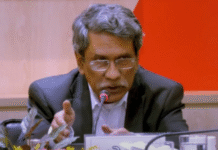How a tweet sparked an investigation that led to a Ph.D. student leaving his program
Mohammed Sahab Uddin associated with Southeast University in Dhaka, Bangladesh caught plagiarized work for a Ph.D. program at Hong Kong University.
retractionwatch.com 27 August 2022
Leslie McIntosh, like many other denizens of Science Twitter, saw a tweet from a pseudonymous account in mid-March that bemoaned a journal’s lack of action after the owner of the account reported “an obvious case of plagiarism.”
The owner of the account had found a paper that ripped off one by his or her own research group while browsing the literature. “It isnt just sentence copying, the whole structure and concept of the paper is THE SAME,” the account tweeted later in the thread.
McIntosh, CEO and cofounder of Ripeta, a tech company that offers automated tools to assess scientific papers, began looking into the paper and its corresponding author, Mohammed Sahab Uddin.
She found that Uddin, a neuropharmacology researcher whose publications abbreviate his first name as “Md,” had published more than 160 papers since 2016 while associated with Southeast University in Dhaka, Bangladesh, before beginning a PhD program at Hong Kong University.
Working with a colleague, she shared her findings with the university, which quickly started an investigation. In the wake of the inquiry, Uddin — who did not respond to our requests for comment — requested to withdraw from the PhD program.
At first, McIntosh said, she was just motivated by “curiosity” to do more research into Uddin. She ran the paper accused of plagiarism through Ripeta’s automated checks for signs of publication integrity and reproducibility, which include analyzing funding statements, conflicts of interest, ethics statements, a study’s objective/hypothesis, data availability, code availability, and software analysis. She also searched the Dimensions database for his other work and analyzed his public profiles on ORCiD and Publons.
Within days, Uddin apparently wiped his ORCiD profile, deleting all citations and references.
It felt like “things were moving fast,” McIntosh said, “and that meant mining as much information before information might be removed (which was the case).”
Using the Dimensions database, McIntosh found Uddin was listed as an author on more than 160 papers and book chapters published since 2016, and his work had been cited more than 3,600 times. Before his Publons profile was wiped, she saw he had more than 300 verified reviews.
Even that assessment of Uddin’s productivity may be an understatement, according to a biography of him on the website of publisher IGI Global:
Md. Sahab Uddin is a Registered Pharmacist and a Research Scholar in the Department of Pharmacy at Southeast University, Dhaka, Bangladesh. He has published copious articles in peer-reviewed international scientific journals. He has also authored and edited seven books, including Advances in Neuropharmacology: Drugs and Therapeutics; Handbook of Research on Critical Examinations of Neurodegenerative Disorders; and Oxidative Stress and Antioxidant Defense: Biomedical Value in Health and Diseases. Md. Uddin also serves as a guest editor, editorial and reviewer board member of numerous scholarly journals. He is a member of many national and international scientific societies. He has developed five neuropsychological tests for the estimation of memory, attention, and cognition. Moreover, he is the Founder and Executive Director of the Pharmakon Neuroscience Research Network, an open innovation hub bringing together neuroscientists to advance brain health. He received his BPharm in 2014 securing a first position from the Department of Pharmacy, Southeast University, Bangladesh. Md. Uddin’s research interest is how neuronal operation can be restored to abate Alzheimer’s dementia.
Uddin’s paper that sparked McIntosh’s investigation, “Exploring the Role of CLU in the Pathogenesis of Alzheimer’s Disease,” was retracted in May. According to the retraction notice in Neurotoxicity Research:
The Editors have retracted this article because a significant part of the content was paraphrased from another article by different authors (Foster et al. 2019). All authors disagree with this retraction.
Evangeline Foster, the corresponding author on the paper that was plagiarized, told us the process with the journal had been “ridiculous and long-winded”:
Despite clear plagiarism which was noted by the journal it still took over a year for the retraction to be recorded.
McIntosh consulted with a colleague, Simon Linacre, Head of Content, Brand and Press at Digital Science, which owns Ripeta, about what to do to publish her findings. After emailing Uddin and waiting two weeks for him to reply, their next step was to contact Hong Kong University, where Uddin was enrolled in a PhD program.
On June 8, Linacre emailed Danny Chan, Hong Kong University’s Director of Education and Development of Research Integrity, following up on previous emails about McIntosh’s findings and asking if the university had done anything to address the concerns.
Chan responded the same day that the university was looking into the matter, and the next day said that the case would be referred to the university disciplinary committee.
At the end of the month, Chan wrote that the university investigation had concluded and made “recommendations” to Uddin. On July 7, a staffer notified McIntosh and Linacre that Uddin would withdraw from Hong Kong University, effective August 1.
McIntosh said she was “impressed” with the investigation:
Dr. Danny Chan and his team at HKU were fantastic to work with. Reading and knowing how slow investigations can take, I was very impressed by both their speed, clarity, and thoughtfulness in communicating with them.
Chan declined to share details of the investigation and its findings with Retraction Watch.
McIntosh told Retraction Watch:
One could say I was interested in going down this rabbit hole because I have a company automating these checks. However, I built a company because I am curious about and trying to improve science, which means understanding how, why, and, when checks in science don’t work.
Like Retraction Watch? You can make a tax-deductible contribution to support our work, follow us on Twitter, like us on Facebook, add us to your RSS reader, or subscribe to our daily digest. If you find a retraction that’s not in our database, you can let us know here. For comments or feedback, email us at team@retractionwatch.com.










